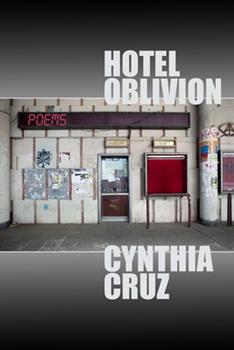The speaker of Cynthia Cruz’s Hotel Oblivion (Four Way Books) inhabits hotel rooms in Warsaw, Berlin, and Belgrade, anonymous rooms simultaneously serving as archives of memory and as blank interiors packed with ephemera: “white stockings in dot- / like patterns,” magazines, postcards, “academic texts on fragments, and a ticket / roundtrip, to Warsaw or Kiev.” Polaroids paper the walls. The speaker enters collected images and films, transforming and disguising herself, including as the star of an “Estonian underground / experimental film,” as a young Jean Genet as seen in a photograph, and as other versions of herself. She is a shapeshifter finding freedom from the body, merging self-examination with examinations of the idea of the self:
The body as animal, a living thing, but
separate from the mind. Singing limb, or
a child not held when small,
left alone: turns, changes. You’ll never recover
Cruz, a student of psychoanalysis and philosophy—as well as an essayist who grapples with intersections of class, trauma, melancholia, and silence—shapes an expansive world of fragments from a synesthetic mind, a body fed Ensure in treatment. For hunger is not merely a metaphor: the speaker has been hospitalized. In enclosures of hotel rooms and through excavation of fragments, the speaker unearths what is beneath: “The cut that was made in me / was made when I was small. / Everything that happened, after, was just play acting.” A mysterious figure, Sabine, “beautiful in her oversized pale-pink / sunglasses and cropped blonde hair, a bit / of Marianne Faithfull, circa 1974,” serves as guide, as psychoanalyst, as reflection of self: “Remember, she said, shame is a veil / milky like film of the upper/ layer of dream. You can lift it.”
Don’t be deceived. This is no straightforward confessional, but curation of carefully staged snapshots of inquiry: How is the nature of memory? What is a body and how can it possibly contain us? How does a poem move through the fragments of memory, knowledge, and images we each contain? These are poems populated by Zürn, Duras, Hölderlin, Derrida, Trakl, and other writers and theorists whose work the speaker consumes:
I am only an empty vessel.
A series of glass vitrines, endless
rooms, or an emptied out
archive. I will take everything in.
Collect, and contain, devour and swallow
every single bell of light and all
of your trembling cells of sorrow.
While this collection echoes sources from her previous books, here Cruz comes into her own. There is something slippery about these poems, as elusive as memory, sticking with you even as you can’t quite take hold of them. “Watch as I transform,” the speaker says, “then vanish before you.”



